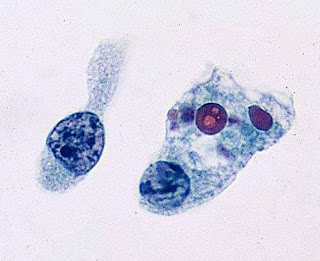Medschool MCQ1: Which of the following viruses causes hemolysis of red blood cells?
Parvovirus B19 infects only humans. You can have a range of symptoms depending on your age and overall health. About two out of 10 people who get infected with this virus will have no symptoms. Others may have only mild, rash illness.
Symptoms
Parvovirus B19 most commonly causes fifth disease, a mild rash illness that usually affects children. Adults can get infected with parvovirus B19 resulting in fifth disease too.
Less common symptoms of parvovirus B19 infection include painful or swollen joints (polyarthropathy syndrome), which is more common in adults, and severe anemia (a condition in which the body doesn’t have enough healthy red blood cells). In rare cases, some of these symptoms can persist for a long time.
Transmission
Parvovirus B19 spreads through respiratory secretions, such as saliva, sputum, or nasal mucus, when an infected person coughs or sneezes. Parvovirus B19 can also spread through blood or blood products. A pregnant woman who is infected with parvovirus B19 can pass the virus to her baby. Any pregnant woman who may have been exposed to parvovirus B19 should contact their obstetrician or healthcare provider as soon as possible.
In the U.S., people tend to get infected with parvovirus B19 more often in late winter, spring, and early summer. Mini-outbreaks of parvovirus B19 infection occur about every 3 to 4 years.
Since parvovirus B19 only infects humans, a person cannot get the virus from a dog or cat. Also, dogs and cats cannot get parvovirus B19 from an infected person.
Pet dogs and cats can get infected with other parvoviruses that do not infect humans. Pets can be vaccinated to protect them from parvovirus infection.
Diagnosis
Your healthcare provider can do a blood test to determine if you are susceptible or possibly immune to parvovirus B19 infection or if you were recently infected. This is not a routine test but can be performed in special circumstances. Talk to your healthcare provider. The blood test may be particularly helpful for pregnant women who may have been exposed to parvovirus B19 and are suspected to have fifth disease. Any pregnant woman who may have been exposed to parvovirus B19 should contact their obstetrician or healthcare provider as soon as possible



Comments
Post a Comment
Thank you for posting your comment.Your question will be answered soon.